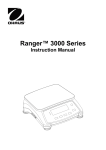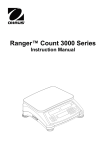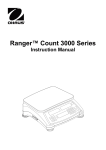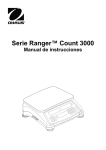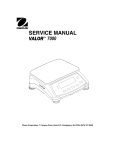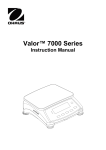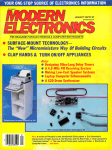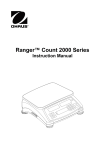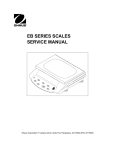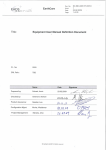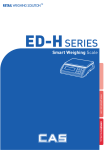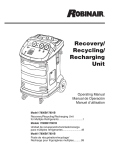Download ranger 3000 manual
Transcript
SERVICE MANUAL RANGER ™ 3000 & RANGER ™ Count 3000 Scales Ohaus Corporation, 7 Campus Drive, Suite 310, Parsippany, NJ 07054 (973) 377-9000 SERVICE MANUAL RANGER ™ 3000 & RANGER ™ Count 3000 SCALES The information contained in this manual is believed to be accurate at the time of publication, but Ohaus Corporation assumes no liability arising from the use or misuse of this material. Reproduction of this material is strictly prohibited. Material in this manual is subject to change. 30072402 © Copyright 2013 Ohaus Corporation, all rights reserved. TM Registered trademark of Ohaus Corporation. TABLE OF CONTENTS Page No. CHAPTER 1 GETTING STARTED 1.1 1.2 1.3 1.4 1.5 Introduction ..............................................................................................................1-1 Service Facilities ......................................................................................................1-1 Tools and Test Equipment Required ........................................................................1-1 Specifications ...........................................................................................................1-2 Scale Operation Ranger Count 3000 .......................................................................1-3 1.5.1 Overview of the Controls ...................................................................................1-3 1.5.2 Power On/Off ....................................................................................................1-4 1.5.3 Menu Setup ......................................................................................................1-5 1.5.4 Menu Navigation ...............................................................................................1-5 1.6 Scale Operation Ranger 3000 ..................................................................................1-6 1.6.1 Overview of the Controls ...................................................................................1-6 1.6.2 Power On/Off ....................................................................................................1-6 1.6.3 Menu Setup ......................................................................................................1-8 1.6.4 Menu Navigation ...............................................................................................1-8 1.7 Legal For Trade .......................................................................................................1-9 1.7.1 Settings.............................................................................................................1-3 1.7.2 Verification ........................................................................................................1-4 1.7.3 Sealing ..............................................................................................................1-5 CHAPTER 2 TROUBLESHOOTING 2.1 2.2 Troubleshooting .......................................................................................................2-1 Diagnostic Guide ......................................................................................................2-1 2.2.1 Diagnosis ..........................................................................................................2-1 2.2.2 Checking Load Cells for Trouble .......................................................................2-2 2.2.3 Testing the Printed Circuit Board (PCB) ............................................................2-4 2.2.4 Diagnostic Guide...............................................................................................2-6 CHAPTER 3 MAINTENANCE PROCEDURES 3.1 Preventive Maintenance ...........................................................................................3-1 3.1.1 Preventive Maintenance Checklist ....................................................................3-1 3.2 Service Strategy.......................................................................................................3-1 3.3 Opening the Scale....................................................................................................3-1 3.2.1 Separating the Top and Bottom Housings .........................................................3-2 3.4 Removing/Replacing the Main Printed Circuit Board (PCB) .....................................3-3 3.5 Removing/Replacing the Load Cell ..........................................................................3-4 3.6 Setting the Overload Stops ......................................................................................3-5 3.7 Removing/Replacing the Rechargeable Battery .......................................................3-7 3.8 Replacing the Function Label ...................................................................................3-7 Ohaus Corporation www.ohaus.com i Ranger™ (Count) 3000 Service Manual TABLE OF CONTENTS CHAPTER 4 TESTING 4.1. Testing .....................................................................................................................4-1 4.1.1 Test Masses Required ......................................................................................4-1 4.2 Operational Test ......................................................................................................4-1 4.3 Segment Display Test ..............................................................................................4-1 4.4. Performance Tests ...................................................................................................4-2 4.4.1 Precision Test ...................................................................................................4-2 4.4.2 Repeatability Test .............................................................................................4-3 4.4.3 Linearity Test ....................................................................................................4-5 4.4.4 Off-Center Load Test ........................................................................................4-5 4.4.5 Adjusting Off Center Load .................................................................................4-6 CHAPTER 5 DRAWINGS AND PARTS LISTS 5-1 5-2 Ranger 3000 Scales: Housing & Internal Parts ........................................................5-2 Ranger Count 3000 Scales: Housing & Internal Parts ..............................................5-4 Appendix A STANDARD CALIBRATION A.1 Calibration ............................................................................................................... A-1 A.2 Setup and Calibration.............................................................................................. A-2 Appendix B SERVICE CALIBRATION B.1 Service Menu Structure ........................................................................................... B-1 B.2 Entering the Service Menu ...................................................................................... B-1 B.3 Capacity Menu ........................................................................................................ B-2 B.4 Graduation Menu .................................................................................................... B-2 B.5 Service Span Calibration ......................................................................................... B-2 B.6 Service Linearity Calibration .................................................................................... B-3 B.7 Ramp Menu ............................................................................................................ B-4 B.8 Expand Menu .......................................................................................................... B-4 B.9 End Menu ............................................................................................................... B-4 LIST OF TABLES TABLE NO. 1-1 1-2 1-3 1-4 1-5 1-6 1-7 1-8 2-1 2-2 2-3 2-4 3-1 3-2 4-1 4-2 4-3 TITLE Page No. Specifications ......................................................................................................1-2 Controls Functions, Ranger Count 3000 ..............................................................1-3 Battery Charge Status Ranger Count 3000 ..........................................................1-4 Ranger Count 3000 Menu Structure ....................................................................1-5 Control Functions, Ranger 3000 ..........................................................................1-6 Battery Charge Status, LCD, Ranger 3000 ..........................................................1-7 Battery Charge Status, LED, Ranger 3000 ..........................................................1-7 Ranger 3000 Menu Structure ...............................................................................1-8 Load Cell Resistance Readings (in Ohms) ..........................................................2-2 Color Code for Load Cell Wiring ..........................................................................2-2 Load Cell Output Readings (in mV with 3.3V Excitation) ......................................2-3 Diagnostic Guide .................................................................................................2-6 Mounting Bolt Torque Settings .............................................................................3-5 Overload Stop Gap Settings ................................................................................3-6 Test Mass Values ................................................................................................4-1 Repeatability Worksheet ......................................................................................4-4 Linearity Test Masses ..........................................................................................4-5 Ranger™ (Count) 3000 Series Service Manual ii Ohaus Corporation www.ohaus.com TABLE OF CONTENTS 5-1 5-2 Ranger 3000 Scales: Housing & Internal Parts ....................................................5-3 Ranger Count 3000 Scales: Housing & Internal Parts..........................................5-5 LIST OF ILLUSTRATIONS FIGURE NO. 1-1. 1-2. 1-3 2-1 3-1 3-2 3-3 3-4 3-5 3-6 3-7 4-1 5-1 5-2 TITLE Ranger Count 3000 Front Display with controls ...................................................1-3 Ranger 3000 Front Display with controls .............................................................1-6 LFT Lock Switch and Seal ...................................................................................1-9 Main Printed Curcuit Board ..................................................................................2-3 Screws securing Top Housing .............................................................................3-2 Top and Bottom Bottom .......................................................................................3-2 Main Printed Circuit Board ...................................................................................3-3 Bolts holding Frame to the Load Cell ...................................................................3-4 Overload stops ....................................................................................................3-5 Overload Gap positions .......................................................................................3-6 Rechargeable Battery ..........................................................................................3-7 Scale drawing of Load Cell and Weighing Pan ....................................................4-6 Ranger 3000 Scales: Housing & Internal Parts ....................................................5-2 Ranger Count 3000 Scales: Housing & Internal Parts……………………………...5-4 Ohaus Corporation www.ohaus.com iii Ranger™ (Count) 3000 Service Manual CHAPTER 1 GETTING STARTED 1.1 INTRODUCTION This service manual contains the information needed to perform routine maintenance and service on the Ohaus Ranger 3000 and Ranger Count 3000 Series scales. Familiarity with the scale’s Instruction Manual is assumed. The contents of this manual are contained in five chapters: Chapter 1 Getting Started – Contains information on service facilities, tools and test equipment, specifications, and the mechanical and electronic functions of the scale. Chapter 2 Troubleshooting – Contains a diagnostic guide and error code table. Chapter 3 Maintenance Procedures – Contains preventive maintenance procedures and disassembly, repair and replacement procedures. Chapter 4 Testing – Contains a list of required test masses, an operational test, segment display test, performance tests and adjustments. Chapter 5 Drawings and Parts Lists – Contains exploded views of Ranger 3000 scales identifying all serviceable components. Appendix A Standard Calibration – Explains procedures for Standard Calibration, performed prior to using a scale, and after service. Appendix B Service Calibration – Describes the Service Menu and sub-menus, which allow authorized service personnel to perform factory Linearity and Span calibrations (no pre-set limits), take Ramp readings, and to set the service menu units. 1.2 SERVICE FACILITIES To service a scale, the service area should meet the following requirements: Should be temperature controlled and meet scale specifications for temperature environmental requirements. Must be free of vibrations such as fork lift trucks close by, large motors, air currents or drafts from air conditioning/heating ducts, open windows, people walking by, fans, etc. Area must be clean and free of excessive dust. Work surface must be stable and level. Scale must not be exposed to direct sunlight or radiating heat sources. Use an approved Electro-Static Device. 1.3 TOOLS AND TEST EQUIPMENT REQUIRED The service shop should contain the following equipment: 1. Standard hand tools. 2. Digital Voltmeter (DVM). 3. Standard Electronics tool kit. 4. Grounding mat and clip. 5. Strain Gauge Simulator. Ranger™ (Count) 3000 Series Service Manual 1-1 Ohaus Corporation www.ohaus.com CHAPTER 1 GETTING STARTED 1.4 SPECIFICATIONS Complete specifications for the Ohaus Ranger 3000 and Ranger Count 3000 scales are listed in Table 1-1. When a scale has been serviced, it must meet the specifications listed in the table. Before servicing the scale, determine what specifications are not met. TABLE 1-1. SPECIFICATIONS Model Capacity Min (20e) Standard readability d= LFT ON readability e=10d= Standard Resolution LFT ON Resolution (nMax) Linearity 2d Repeatability 2d Hysteresis 2d Off Center Load 2d Creep (60s, 2d) Creep (30 min. 0.5e) MPE Stabilization Time Combined effect (Increasing / Decreasing Load) Zero Drift vs. Temp 2d/ C Span Drift vs. Temp 1d/ C, Less or equal than MPE Operating Conditions Storage Temperature Pan Size R31P(E)1502 RC31P1502 R31P(E)3 RC31P3 R31P(E)6 RC31P6 R31P(E)15 RC31P15 R31P(E)30 RC31P30 1.5 kg 3 lb 0.01kg 3 kg 6 lb 0.02kg 6 kg 15 lb 0.04kg 15 kg 30 lb 0.1kg 30 kg 60 lb 0.2kg 0.02lb 0.04lb 0.1lb 0.2lb 0.4lb 0.00005 kg 0.0001 lb 0.0005 kg 0.001 lb 0.0001 kg 0.0002 lb 0.001 kg 0.002 lb 0.0002 kg 0.0005 lb 0.002 kg 0.005 lb 0.0005 kg 0.001 lb 0.005 kg 0.01 lb 0.001 kg 0.002 lb 0.01 kg 0.02 lb 1:30000 1:30000 1:30000 1:30000 1:30000 1:3000 1:3000 1:3000 1:3000 1:3000 0.0001 kg 0.0001 kg 0.0001 kg 0.0001 kg 0.0001 kg 0.0002 kg 0.0002 kg 0.0002 kg 0.0002 kg 0.0002 kg 0.0005 kg 0.0005 kg 0.0005 kg 0.0005 kg 0.0005 kg 0.001 kg 0.001 kg 0.001 kg 0.001 kg 0.001 kg 0.002 kg 0.002 kg 0.002 kg 0.002kg 0.002 kg 0.0002 kg 0.0005 kg 0.001 kg 0.002 kg 0.005 kg 1 sec. 1 sec. 1 sec. 1 sec. 1 sec. MPE MPE MPE MPE MPE 0.0001 kg / C 0.0002 kg / C 0.0005 kg / C 0.001 kg / C 0.002 kg / C 16.7ppm / C 16.7ppm / C 16.7ppm / C 16.7ppm / C 16.7ppm / C -10 C to 40 C -10 C to 40 C -10 C to 40 C -10 C to 40 C -10 C to 40 C -40 C to 60 C -40 C to 60 C -40 C to 60 C -40 C to 60 C -40 C to 60 C 225 x 300 mm 225 x 300 mm Ohaus Corporation www.ohaus.com 225 x 300 mm 1-2 225 x 300 mm 225 x 300 mm Ranger™ (Count) 3000 Series Service Manual CHAPTER 1 GETTING STARTED 1.5 SCALE OPERATION – RANGER COUNT 3000 This section contains information on the basic operation of the Ranger Count 3000 scale. 1.5.1 OVERVIEW OF THE CONTROLS Figure 1-1. Ranger Count 3000 Front Display with controls. TABLE 1-2. Control functions Ranger Count 3000 Button Primary Function (Short 1 Press ) Secondary Function (Long 2 Press ) Menu Function (Short Press) Library Function (Short Press) ON/ZERO Turn scale on. Zero the display. PRINT Send the displayed value to the COM port. Off Turn scale off. Units Change the weighing unit. Yes Accept the current menu or setting. No Advance to the next menu or setting. Increment the displayed value. No Advance to the next library or setting. Increment the displayed value. Yes Accept the current setting. Target Initiate the function of the current application mode. Switch between Check Weigh, Check Count and Off. Back Go back to the previous menu or setting. Decrement the displayed value. Back Go back to the previous library or setting. Decrement the displayed value. Ranger™ (Count) 3000 Series Service Manual 1-3 M+ Accumulate the weight or pieces. ID ID number input for library record edit/recall. APW Display/ Store an APW Menu Enter user menu. View the Audit Trail event counters (extended press) Exit Exit the menu. Abort the calibration in progress. Exit Exit the library. Ohaus Corporation www.ohaus.com CHAPTER 1 GETTING STARTED TABLE 1-2. Cont. Button Primary Function (Short Press) 0-9 Enter numeric values on the display. Switch between scale 1 and scale 2 (only available if second platform is connected) Secondary Function (Long Press) 1.5.2 . Enter dot (.) on the display. C Clear the last character from the display. +/- Tare Perform a tare operation. Sample Display/ Start new APW Switch between positive and negative value Power ON/OFF To turn the scale on, press and hold the On/Zero Off button for 2 seconds. The scale performs a display test, momentarily displays the software version, and then enters the active weighing mode. To turn the scale off, press and hold the On/Zero Off button until OFF is displayed. The scale can be used on AC power immediately. Allow the battery to charge for 12 hours before using the scale on battery power. The scale will automatically switch to battery operation if there is a power failure or the power cord is removed. With AC power, the scale is constantly charging, so the battery charge indicator will remain lit until fully charged. The scale can be operated during charging, and the battery is protected against overcharging. During battery operation, the battery symbol indicates the battery charge level. The scale will automatically turn off when the batteries are fully discharged. For maximum operating time, the battery should be charged at room temperature. TABLE 1-3 Battery Charge Status Ranger Count 3000 Symbol Charge Level 0 to 10 % Remaining 11 to 40 % Remaining 41 to 70 % Remaining 71 to 100 % Remaining Notes: When battery symbol blinks fast, approximately 30 minutes working time is left. When [lo.bat] is displayed, the scale will shut off. Charging the scale must be performed in a dry environment. CAUTION: Battery is to be replaced only by an authorized Ohaus service dealer. Risk of explosion can occur if the rechargeable battery is replaced with the wrong type or if it is not properly connected. Dispose of the lead acid battery according to local laws and regulations. Ohaus Corporation www.ohaus.com 1-4 Ranger™ (Count) 3000 Series Service Manual CHAPTER 1 GETTING STARTED 1.5.3 Menu Setup Programmable features of the Ranger Count 3000 scales are contained in menus which are accessed through the Display Panel’s control switches. See the Instruction Manual for a full description of the menus and how to access them. TABLE 1-4. RANGER COUNT 3000 MENU STRUCTURE Menu: C.A.L S.E.t.U.P r.E.A.d U.n.i.t Span Reset Reset Reset Lin D.Scale Stable kg Menu GEO Pwr. Un Filter g Items: End Zero AZT lb Aut.Opt Light oz A.Tare A.Off lb:oz Bp.Key End End Bp.Opt Bp.Sig Accum End Menu Items: 1.5.4 P.r.i.n.t Reset Stable A.Print Contnt Layout Data.Tr End C.O.M Reset Baud Parity Stop Handsh Alt.Cm End L.O.C.k L.Cal L.Setup L.Read L.Unit L.Print L.COM End E.n.d Menu Navigation Press and hold Menu until [mMeNU] (Menu) is displayed. When released the first sub-menu [C.a.l] (Cal) will be shown. Summary of button navigation functions in menu mode: -- Yes Allows entry into the displayed menu. - Accepts the displayed setting and advances to the next item. -- No Skips by the displayed menu. - Rejects the displayed setting or menu item and advances to the next available item. -- Back Moves backwards through the upper and middle level menus. - Backs out of a list of selectable items to the previous middle level menu. -- Exit Exits from menu directly to the active weighing mode. Ranger™ (Count) 3000 Series Service Manual 1-5 Ohaus Corporation www.ohaus.com CHAPTER 1 GETTING STARTED 1.6 SCALE OPERATION – RANGER 3000 This section contains information on the basic operation of the Ranger 3000 scale. 1.6.1 OVERVIEW OF THE CONTROLS Figure 1-2. Ranger 3000 Front Display with controls. Button On/Zero Off Yes Print Units No Function Mode Back M+ Menu Exit Tare 1.6.2 TABLE 1-5. Functions Short Press (when on): Sets display to zero (when off): Turns scale on Long Press (when on): Turns the scale off Short Press (in Menu): Selects/accepts displayed setting Short Press: Sends current display value to serial port (auto print OFF). Long Press: Toggles through active weighing units Short Press (in Menu): Toggles through available settings Short Press: Selects function setting Long Press: Selects active Mode Short Press (in Menu): returns to previous settings Short Press: Accumulates the weight or displays the accumulated information at 0 load. Long Press: Enters User Menu Short Press (in Menu): Quickly exit User Menu Short Press: Enter/clear a tare value. Clears the accumulation when the accumulation information is displayed. Power ON/OFF To turn the scale on, press and hold the On/Zero Off button for 2 seconds. The scale performs a display test, momentarily displays the software version, and then enters the active weighing mode. To turn the scale off, press and hold the On/Zero Off button until OFF is displayed. Ohaus Corporation www.ohaus.com 1-6 Ranger™ (Count) 3000 Series Service Manual CHAPTER 1 GETTING STARTED The scale can be used on AC power immediately. Allow the battery to charge for 12 hours before using the scale on battery power. The Scale will automatically switch to battery operation if there is a power failure or the power cord is removed. With AC power, the scale is constantly charging, so the battery charge indicator will remain lit. The scale can be operated during charging, and the battery is protected against overcharging. For maximum operating time, the battery should be charged at room temperature. LCD models: During battery operation, the battery symbol indicates the battery charge level remaining. The indicator will automatically turn off when the batteries are fully charged. Symbol TABLE 1-6 Charge level 0 to 10 % Remaining 11 to 40 % Remaining 41 to 70 % Remaining 71 to 100 % Remaining LED models: During battery operation, the battery symbol indicates the battery charging status. When charging, the symbol will blink slowly and when fully charged the symbol will be turned off. Symbol TABLE 1-7 Charge level Battery in use: Symbol displayed Notes: When battery symbol blinks fast, approximately 30 minutes working time is left. When [lo.bat] is displayed, the scale will shut off. Charging the scale must be performed in a dry environment. CAUTION: Battery is to be replaced only by an authorized Ohaus service dealer. Risk of explosion can occur if the rechargeable battery is replaced with the wrong type or if it is not properly connected. Dispose of the lead acid battery according to local laws and regulations. Ranger™ (Count) 3000 Series Service Manual 1-7 Ohaus Corporation www.ohaus.com CHAPTER 1 GETTING STARTED 1.6.3 Menu Setup Programmable features of the Ranger 3000 scales are contained in menus which are accessed through the Display Panel’s control switches. See the Instruction Manual for a full description of the menus and how to access them. TABLE 1-8. RANGER 3000 MENU STRUCTURE C.A.L S.E.t.U.P r.E.A.d M.O.d.E Span Reset Reset Reset Lin Pwr.Un Stable Weigh Menu GEO Zero Filter Percnt Items: End A.Tare AZT Count Bp.Sig Light Check Bp.Key Sleep1 Dynam Accum A.Off End End End Menu: U.n.i.t Reset kg Menu g Items: lb oz lb:oz End P.r.i.n.t Reset Stable A.Print Contnt Layout Data.Tr End C.O.M Reset Baud Parity Stop Handsh Alt.Cm End L.O.C.k L.Cal L.Setup L.Read L.Mode L.Unit L.Print L.COM End E.n.d Note: 1 only for LED version. 1.6.4 Menu Navigation Press and hold Menu until [mMeNU] (Menu) is displayed. When released the first sub-menu [C.a.l] (Calibration) will be shown. Summary of button navigation functions in menu mode: -- Yes Allows entry into the displayed menu. - Accepts the displayed setting and advances to the next item. -- No Skips by the displayed menu. - Rejects the displayed setting or menu item and advances to the next available item. -- Back Moves backwards through the upper and middle level menus. - Backs out of a list of selectable items to the previous middle level menu. -- Exit Exits from menu directly to the active weighing mode. Ohaus Corporation www.ohaus.com 1-8 Ranger™ (Count) 3000 Series Service Manual CHAPTER 1 GETTING STARTED 1.7 LEGAL FOR TRADE When the scale is used in trade or a legally controlled application it must be set up, verified and sealed in accordance with local weights and measures regulations. It is the responsibility of the purchaser to ensure that all pertinent legal requirements are met. The Menu Lock switch limits changes to the Cal, Setup, Mode and Unit menus. The switch in type approved models may set some scale settings as required by the approval agency. The switch may be secured using paper seals, wire seals or plastic ties. Note: When LEGAL FOR TRADE is set to ON (LFT Switch in locked position), the menu settings are affected as follows: Calibration (C.A.L) menu is not accessible Unit menu, Auto Tare: are locked at their current setting(s) Filter is locked at current setting Stable Range setting is locked at 1d Zero Range setting is locked at 2%. Auto-Zero Tracking setting is locked at 0.5d Stable Only is locked On Auto Print/ Continuous is disabled 1.7.1 Settings Before verification and sealing, perform the following steps: 1. Verify that the menu settings meet the local weights and measures regulations. 2. Perform a calibration, see instruction manual. 3. Set the switch to Locked. See figure 1-3. 1.7.2 Verification The local weights and measures official or authorized service agent must perform the verification procedure. 1.7.3 Sealing The local weights and measures official or authorized service agent must apply a security seal to prevent tampering with the settings. Refer to the illustration below for sealing methods. Paper Seal Lock Switch Unlocked Locked with Paper Seal Wire Seal Locked with Wire Seal Figure 1-3. Sealing Ranger™ (Count) 3000 Series Service Manual 1-9 Ohaus Corporation www.ohaus.com CHAPTER 2 DIAGNOSTIC GUIDE 2.1 TROUBLESHOOTING This section of the manual contains troubleshooting information. Information is contained to isolate specific problems using Table 2-4, Diagnostic Guide. Follow all directions step by step. Make certain that the work area is clean. Handle balance components with care. Use appropriate Electro-Static Device. 2.2 DIAGNOSTIC GUIDE Table 2-4 is a Diagnostic Guide designed to help locate the problem area quickly and easily. The probable causes are listed with the most common cause first. If the first remedy does not fix the problem, proceed to the next remedy. Before attempting to repair the balance, read all chapters of this manual to be familiar with the balance components and operation. 2.2.1 Diagnosis 1 Isolate and identify the symptom. 2 Refer to Table 2-4, Diagnostic Guide and locate the symptom. 3 Follow the suggested remedies in the order they appear. 4 Perform the indicated checks, or see the appropriate section of the manual. 5 Repair or replace the defective section of the balance. NOTE: If more than one symptom is observed, approach one area at a time, and remember that the symptoms may be interrelated. If a problem arises that is not covered in this manual, contact Ohaus Corporation for further information. Ranger™ (Count) 3000 Series Service Manual 2-1 Ohaus Corporation www.ohaus.com CHAPTER 2 DIAGNOSTIC GUIDE 2.2.2 Checking Load Cells for Trouble 1. Perform a Resistance Test, to determine if the Load Cell is severely damaged or a short circuit to the frame has occurred. Note: The Load Cell must be completely disconnected from the Printed Circuit Board and at no load when the resistance readings are taken. Using an ohm meter, measure and record resistance between each pair of wires from the Load Cell, as specified in Table 2-1. Compare the measured readings with the specified values in Table 2-1. If the resistance readings are in the range specified, skip to the next section. If they are outside the expected range, open circuit or short-circuit across any two wires, the Load Cell is defective: replace it. (See Chapter 3.) TABLE 2-1. LOAD CELL RESISTANCE READINGS (in Ohms) Model Ex+ to Ex– S+ to S– Ex+ to S– Ex+ to S+ Ex– to S+ Ex– to S– All models 404 ± 10 350 ± 4 289 ± 10 289 ± 10 289 ± 10 289 ± 10 2. Perform an Output Voltage Test: Measure the no load, 50% load and full load output. The reading should meet the Load Cell specifications. The Load Cell output should be very close to linear over its capacity range. NOTE: The following steps involve power applied to the scale. Load Cell solder contacts can be used as measuring points. See Figure 2-1. The EXE+ and EXE– wires should be connected to the PCB, and the SIG+ and SIG– wires must be disconnected. Record the colors for each wire connection before disconnecting. (See Table 2-2 for typical color code for Ranger 2000 and Ranger Count 2000.) TABLE 2-2. COLOR CODE FOR LOAD CELL WIRING* AMI BLACK GREEN WHITE RED EXE– EXE+ SIG+ SIG– *Color codes may vary. – Insert the Platform Support into the Load Cell Frame, place the Platform on top, and turn on power to the scale. – Using a voltmeter, measure and record the excitation voltage supplied to the PCB: with no load on the Platform, measure the voltage across points 4 and 1 of Load Cell connection on the PCB (+EXE and –EXE). This voltage must be approximately 3.1 Volts dc with the Load cell connected. If the voltage is lower, disconnect the Load Cell cable from the PCB and measure again. If the voltage is 3.1 Volts dc, the Load Cell is defective and must be replaced. If the voltage remains low, the PCB is defective and must be replaced. Ohaus Corporation www.ohaus.com 2-2 Ranger™ (Count) 3000 Series Service Manual CHAPTER 2 DIAGNOSTIC GUIDE CAUTION: IN THE NEXT STEP, DO NOT OVERLOAD THE SCALE BEYOND FULL CAPACITY RATING. – Measure the voltages on +SIG and –SIG wires, disconnected from PCB. Note: Measurements must be made with these wires disconnected from the PCB. These measurements represent the output of the Load Cell. Record measurements at Zero Load, 50% and full scale capacities. See Table 2-3 for typical readings. Figure 2-1. Top view of main PCB. NOTE: Table 2-3 indicates typical readings. Actual values can vary, but should remain linear throughout the range. If readings are out of tolerance, replace the Load cell. (See Section 3.6.) TABLE 2-3. LOAD CELL OUTPUT READINGS (in mV/V with 3.1V Excitation) Model/Capacity Zero Load 50% Load 100% Load 0.492666667 0.992666667 1.49266667 R31P(E)3 / 3kg RC31P3 / 3kg 0.2956 0.8956 1.4956 R31P(E)6 / 6kg RC31P6 / 6kg 0.1478 0.7478 1.3478 R31P(E)15 / 15kg RC31P15 / 15kg 0.0739 0.8239 1.5739 R31P(E)30 / 30 kg RC31P30 / 30 kg 0.03695 0.78695 1.53695 R31P(E)1502 / 1.5kg RC31P1502 / 1.5kg Ranger™ (Count) 3000 Series Service Manual 2-3 Ohaus Corporation www.ohaus.com CHAPTER 2 DIAGNOSTIC GUIDE 2.2.3 Testing the Printed Circuit Board (PCB) The PCB can be tested by measuring voltages and by using a simulator. The simulator replaces the Load Cell during testing and is a useful tool for diagnosing problems. PCB Voltage Measurements Note: Prior to the voltage measurements, the battery should be fully charged and tested. 1. Disconnect power from the scale, and remove the Top housing. (See Section 3.3.1.) CAUTION: Disconnect the power from the scale before opening the housing. 2. Connect the AC Adapter to the scale and turn the scale on. 3. Using a DVM, measure the excitation voltage (EXE+ and EXE– in Figure 2-1.) The reading should be 3.1 volts dc. This is the excitation voltage for the Load Cell and is regulated. If the voltage is lower, replace the PCB. (See Section 3.4.) Then perform Operational Tests. (See Chapter 4.) 4. Measure incoming power from the transformer connector shown in Figure 2-1. The voltage should read 0 volts with power off and above 12 Volts dc with power on. 5. Perform simulator testing. Simulator Testing To perform these tests, the use of a Simulator is required. The function of a Simulator is to simulate the output of a full bridge Load Cell, allowing the scale to be separated from the Load Cell for the purposes of troubleshooting and calibration. The Load Cell used in the scale is rated at 2mV/V output with a 3.1 Volt excitation voltage applied. Ohaus Corporation www.ohaus.com 2-4 Ranger™ (Count) 3000 Series Service Manual CHAPTER 2 DIAGNOSTIC GUIDE General Load Test This test checks the Main PC Board circuitry by simulating accurate Load Cell voltages at zero load, 50% and 100% load capacities. Disconnect power from the scale, and remove the Top housing. (See Section 3.3.1.) Leave the Mechanical Switch connected to the scale. Disconnect the battery. 1. Disconnect the Load Cell cable from the main PC Board. 2. With the Simulator set to zero, solder its cable leads to their counterparts on the PCB, using the Load Cell Cable solder points on the PCB. (See Figure 2-1.). 3. Connect a known good AC Adapter to the scale and connect to a power source. 4. Turn on the scale. An under load error may appear. This is normal. 5. Set the scale to indicate weight in kilograms (kg) and set the calibration value to maximum span value. 6. Adjust the Simulator to simulate 0% load, 50% load and 100% load for the capacity that the scale is rated for. (See Table 2.3 for values to use.) If the resulting readings are unstable, the Main PC Board is defective. 7. Use the Simulator to calibrate the scale in the next procedure to verify if the Main PC Board is good or bad. Calibration Test This test calibrates the scale using the simulator and can verify that the Main PC Board is functioning properly or improperly. 1. With the scale on, enter the scale menu and perform a span calibration. (See Appendix A.) 2. Follow the scale prompts. When the scale indicates a given weight to be placed on the scale, set the simulator to an equivalent value based on Table 2-3. 3. Upon completion of calibration, the PCB can be further checked using the Simulator to simulate various weight values. If simulator settings and weight readings on the scale agree, the PCB is functional. If the scale readings vary, or do not agree with readings in Table 2-3, the Main PC Board is defective and should be replaced. (See Chapter 3.) Ranger™ (Count) 3000 Series Service Manual 2-5 Ohaus Corporation www.ohaus.com CHAPTER 2 DIAGNOSTIC GUIDE 2.2.4 Diagnostic Guide TABLE 2-4. DIAGNOSTIC GUIDE Symptom Cannot turn on Cannot calibrate Cannot access mode Cannot access unit Possible Cause No power to scale Improper calibration Unstable environment LFT locked Mode not enabled Unit not enabled Battery icon flashing Low Battery error Err 8.1 Power On Error Err 8.2 Power On Error Err 8.3 Over Range Error Weight reading exceeds Overload limit Err Err Err Err Under Range Error Tare out of range Display overflow Calibration data error Weight reading below Underload limit Adjust tare value to be within range Weight exceeds 6 digits Calibration data not present ------- Busy Displayed during tare setting, zero setting, printing --NO-- Action not allowed Function not executed CAL E Calibration error Calibration value outside allowed limits Unstable environment Move the scale to suitable location Incorrect calibration weight Use correct calibration weight Lo.ref Low reference weight warning ref.err Unacceptable reference weight Battery fails to charge fully Battery is defective Poor accuracy 8.4 8.5 8.6 9.5 Ohaus Corporation www.ohaus.com 2-6 Remedy Verify connections and voltage Perform calibration Move scale to suitable location See chapter 5 for information. Enter menu and enable mode Enter menu and enable unit Connect scale to AC power and charge the battery Weight reading exceeds Power On Zero limit Weight reading below Power On Zero limit Increase reference weight Reference weight too small. Weight on the pan is too small to define a valid reference weight. Increase reference weight. Have battery replaced by Ohaus authorized service dealer. Ranger™ (Count) 3000 Series Service Manual CHAPTER 3 MAINTENANCE PROCEDURES 3.1 PREVENTIVE MAINTENANCE Ohaus scales are precision instruments and should be carefully handled, stored in a clean, dry, dust-free area, and cleaned periodically. Follow these precautionary steps: – When a scale has had chemicals or liquids spilled on it, all exterior surfaces should be cleaned as soon as possible with warm water on a damp cloth. – Do not leave a mass on the scale when the scale is not in use. – Allow time for the scale to stabilize after moving it from an area which is at a different temperature than the area where it is to be operated. Allow one hour for each 5°F (2.7°C) temperature change before using the scale. After temperature stabilization, allow another 20 minutes after turning the scale on, for the scale electronics to stabilize. 3.1.1 Preventive Maintenance Checklist The scale should be inspected and checked regularly, as follows: 1. Remove the Pan and Sub Pan to inspect and clean the area beneath the Pan. 2. Clean the outside of the scale using a damp cloth with warm water. CAUTION DO NOT USE CHEMICAL CLEANERS OR SOLVENTS OF ANY TYPE. SOME CLEANERS ARE ABRASIVE AND MAY AFFECT THE SCALE’S FINISH. 3. Check the Power Cord for broken or damaged insulation. 4. If using the rechargeable battery and the scale malfunctions, first recharge the battery to see if this resolves the problem. 5. Make a visual inspection for faulty connectors, wiring, and loose hardware. 3.2 SERVICE STRATEGY All parts of the Ranger 3000 and Ranger Count 3000 are designed to be replaced rather than repaired. This includes the Main Printed Circuit Board (PCB) and Switches PCB, the Load Cell, and the cables. For an illustrated list of replaceable parts, see Chapter 5. 3.3 OPENING THE SCALE Use these procedures in order to replace the Load Cell, any of the Printed Circuit Boards and/or LCD Displays. Ranger™ (Count) 3000 Series Service Manual 3-1 Ohaus Corporation www.ohaus.com CHAPTER 3 MAINTENANCE PROCEDURES 3.3.1 Separating the Top and Bottom Housings Common hand tools are sufficient to disassemble the Ranger 3000 and Ranger Count 3000 scales. Turn the scale off and unplug the power cord before you begin. 1. Lift off the Weighing Pan. 2. Turn the scale over. Remove the eight screws holding the Housing in place. (See Figure 3-1.) 3. Move the top housing a little bit backward and then raise and remove the top housing. 4. Separate Top Housing from Bottom Housing. Avoid straining the cables that connect the Main PCB to the parts in the Bottom Housing. (Lay the two housings close to each other, so cable is not strained.) Figure 3-1. Ranger 3000 Bottom. Figure 3-1. Screws (marked with white circles) that secure the housing. Display PCB Main PCB Load Cell Frame Load Cell Cable leads. Figure 3-2. Top and Bottom Housings Ohaus Corporation www.ohaus.com 3-2 Ranger™ (Count) 3000 Series Service Manual CHAPTER 3 MAINTENANCE PROCEDURES 3.4 Removing/Replacing the Main PCB and Display PCB If the PCBs are suspected of being faulty, they should be replaced, as follows: 1. Disconnect the Cable connecting the Main PCB to the scale’s power system. (See Figure 3-2.) 2. Remove the four screws that secure the PCB to the bottom housing. 3. If either the Main PCB or the Load Cell is to be replaced, note the order of the wire colors and then disconnect the Load Cell Cable from the Main PCB. (See Figure 32.) 4. Position the replacement PCB as in Figure 3-2, insert and tighten the screws. 5. Re-connect the Load Cell Cables to the PCB, in the same position as originally installed. 6. Re-connect the Cable connecting the Main PCB to the scale’s power system. (See Figure 3-2.) 7. Insert and tighten the screws that secure the PCB to the bottom housing. Figure 3-3. Main Printed Circuit Board. Ranger™ (Count) 3000 Series Service Manual 3-3 Ohaus Corporation www.ohaus.com CHAPTER 3 MAINTENANCE PROCEDURES 3.5 Removing/Replacing the Load Cell A Load Cell that is even slightly bent or corroded should be replaced. The Load Cell may also need to be replaced because of instability, or because the scale does not calibrate or repeat. Note: The Load Cell is sold separately. (See Chapter 5.) 1. Unplug the cable leads connecting the Load Cell to the PCB. (See Figure 3-2.) 2. Turn the scale over and remove the bolts and washers that hold the Load Cell assembly (frame and load cell) to the Bottom Housing. Remove the bolts and their washer pairs that hold the Load Cell Frame to the Load Cell. Use a high-leverage Allen wrench. 3. Lift the Load Cell away from the frame. Figure 3-4. Remove the bolts holding Frame to the Load Cell. 4. When installing the replacement Load Cell, first secure the bottom frame to the load cell with the screws and then secure the top frame to the load cell. Adjust the down/up stop gaps (see table 3-2). Install the load cell assembly to the bottom housing. Insert the bolts and their washers, and tighten the bolts. (See Table 3-1 for torque settings.) 5. Connect the Load Cell cables to the PCB. (See Figure 3-2.) Ohaus Corporation www.ohaus.com 3-4 Ranger™ (Count) 3000 Series Service Manual CHAPTER 3 MAINTENANCE PROCEDURES TABLE 3-1. MOUNTING BOLT TORQUE SETTINGS MODEL TORQUE SETTING R31P(E)1502 RC31P1502 6N to 8N R31P(E)3 RC31P3 6N to 8N R31P(E)6 RC31P6 6N to 8N R31P(E)15 RC31P15 6N to 8N R31P(E)30 RC31P30 6N to 8N 6. Set Overload Stops as shown in Section 3.6. 3.6 Setting the Overload Stops The Overload Stop gaps must be checked and reset if the Load Cell is replaced. This procedure requires test masses equal to the scale’s capacity. (See Table 3-2.) There are four Overload Stop Bolts. (See Figure 3-5.) Adjust the Overload Stops, per Table 3-2: 1. Adjust the Overload Stop Bolt so that the gap between the Load Cell Frame and the Overload Stop Nut is equal to the specification in Table 3-2. (The gap can be tested by applying 100% load, one corner at a time, at each corner stop. If the gap is right, the Load Cell Frame will just touch the Overload Overload Stop Nut.) Stops Note: Be careful not to overload the Load Cell, which would damage it. Figure 3-5. Overload Stops. 2. Repeat this for all four corners. 3. Test the scale to see if full capacity can be achieved. Ranger™ (Count) 3000 Series Service Manual 3-5 Ohaus Corporation www.ohaus.com CHAPTER 3 MAINTENANCE PROCEDURES TABLE 3-2. Ranger 3000/Ranger Count 3000 OVERLOAD STOP GAP SETTINGS Model Max. Capacity Overload Stop Gap R3000 / RC 3000 Scale Load Cell A/B mm C/D mm 1.5kg 3kg 0.6 0.5 R31P(E)3 RC31P3 3kg 5kg 0.8 0.7 R31P(E)6 RC31P6 6kg 10kg 1.5 1.1 R31P(E)15 RC31P15 15kg 20kg 2.4 1.7 R31P(E)30 RC31P30 30kg 40kg 2.4 1.7 R31P(E)1502 RC31P1502 A D Load Cell B C Figure 3-6. Gap position of corners A, B, C, D. (A & B represent the front of the scale.) Ohaus Corporation www.ohaus.com 3-6 Ranger™ (Count) 3000 Series Service Manual CHAPTER 3 MAINTENANCE PROCEDURES 3.7 Removing/Replacing the Rechargeable Battery The Ranger 3000/Ranger Count 3000 has a rechargeable battery. If it fails to recharge, replace it as follows: 1. Lift the battery’s front end enough to access the quick-connect tabs holding the wire leads. Note: Be careful not to short-circuit the battery leads. 2. Pull the quick-connect tabs free of the battery posts, and lift out the battery. Figure 3-7. Rechargeable battery. 3. Position the replacement battery in the compartment on an angle sufficient to access the battery posts. 4. Insert the quick-connect tabs on their respective posts, and place the battery fully in the battery compartment 3.8 Replacing the Function Label The Function Label may need to be replaced. (See Chapter 5 for parts information.) Use a broad knife to remove the label. Clean the glue residue from the Housing surface. Then carefully place the new label where the old one was. Ranger™ (Count) 3000 Series Service Manual 3-7 Ohaus Corporation www.ohaus.com CHAPTER 4 TESTING 4.1 TESTING Before and after servicing a Ranger 3000/Ranger Count 3000 scale, an operational test and various performance tests should be made to confirm that the scale meets specifications. Turn the scale on and allow it to warm up for at least one hour before performing these tests. NOTE: Make sure the test area is free from drafts and that the scale rests on a level and vibration-free surface. 4.1.1 TEST MASSES REQUIRED The masses required to test the Ohaus Ranger 3000/Ranger Count 3000 scales must meet the requirements of ASTM Class 4 or OIML F2 Tolerance. The mass values are listed in Table 4-1. TABLE 4-1. TEST MASS VALUES 4.2 Model Weight (g) R31P(E)1502 RC31P1502 1kg,500g,200g R31P(E)3 RC31P3 1kg,500g R31P(E)6 RC31P6 2kg,1kg,500g R31P(E)15 RC31P15 10kg,5kg,2kg R31P(E)30 RC31P30 10kg,5kg Operational Test 1. Connect a functioning Power cord to the back of the scale. 2. Plug the Power Cord into a suitable power source, or power the scale on using battery power. (Assure that the battery is charged beforehand.) 4.3 Segment Display Test Turn the scale on, and ensure that all segments are enabled and displayed briefly and followed by a software revision number. Ranger™ (Count) 3000 Series Service Manual 4-1 Ohaus Corporation www.ohaus.com CHAPTER 4 TESTING 4.4 Performance Tests Accurate performance of the Ranger 3000/Ranger Count 3000 scale is determined by a series of four performance tests. The displayed readings are compared with the tolerances listed for each test in Table 1-2. Tolerance values are expressed in counts. A one-count difference is shown in the last digit on the scale display. NOTE: The following performance tests are used to evaluate scale operation before and after repairs. The scale must meet the requirements specified in each test as well as the other specifications listed in Table 1-1. Before proceeding with the following tests, the scale should be calibrated. (See Appendix A and B.) 4.4.1 Precision Test The Precision Test measures the Standard Deviation of a set of similar weight readings, which should match the specification for each model, listed in Table 1-1. 1. Power on the balance. The reading on the display should be 0g. 2. Select a mass weighing near the maximum capacity of the balance, and place it on the center of the Pan. Observe and record the reading. 3. Remove the mass. The reading should return to 0g ±2 count. 4. Repeat this test three times. The reading should be within ±2 count of the reading recorded. If so, the balance passes the Precision Test. 5. If the deviation for any set of readings (using the same mass placed on the center of the Pan) is greater than ±2 d, the balance does not meet the precision specification. Inspect and correct the following areas: – Check for mechanical obstructions. Any foreign object touching any part of the moving assemblies will cause a balance to fail the Precision Test. Inspect and correct as necessary. – If the scale does not meet specifications, move it to a suitable location, ensure that it is level, and try again. If it still does not meet specifications, perform a service calibration, and try again. (See Appendix B for Service Calibration.) Ohaus Corporation www.ohaus.com 4-2 Ranger™ (Count) 3000 Series Service Manual CHAPTER 4 TESTING 4.4.2 Repeatability Test Repeatability is the Standard Deviation of a set of similar weight readings. Requirements: – To perform this test a single mass must be used for all readings. – The test mass should be approximately ½ of the capacity of the instrument. – Wear gloves when handling the mass. Before starting a repeatability test, set up the instrument as follows: Set Up: Follow the steps in Appendix A, Section A-2, Setup and Calibration. Record Settings: Zero Tracking Setting = ____________ Displayed Units = ____________ Mass Used = ____________ TEST PROCEDURE: 1. Zero the instrument, if it does not read zero. 2. Using a test mass approximately half the capacity of the instrument, place the mass on the center of platform. Record the reading on the worksheet provided. 3. Remove the mass from the platform. 4. Repeat this test starting at Step 1 until you record a total of ten readings Fill in the worksheet (Table 4-2) with the ten (10) readings. Ranger™ (Count) 3000 Series Service Manual 4-3 Ohaus Corporation www.ohaus.com CHAPTER 4 TESTING TABLE 4-2. REPEATABILITY WORKSHEET n Reading Delta = Reading – Mean Delta x Delta 1 2 3 4 5 6 7 8 9 10 n = number of Reading Mean = Sum of readings / 10 Delta = Reading – Mean Standard Deviation = Square Root of (sum of (Delta x Delta) / 9) 5. Add the ten readings and divide the total by 10 to find the Mean (average). 6. Mean = (Reading 1 + Reading 2 + Reading 3 + Reading 4 + Reading 5 7. + Reading 6 + Reading 7+ Reading 8 + Reading 9 + Reading 10) / 10 Mean =________ 6. Calculate the Delta for each reading and record in the work sheet. Delta = Reading – Mean 7. Calculate the Delta x Delta for each reading and record in worksheet. 8. Add the ten Delta x Delta values and divide by 9 9. Calculate the Standard Deviation by applying the square root of the result from step 8. Standard Deviation =___________ Note: If the balance does not meet specifications, move it to a suitable location, ensure that it is level, and try again. Ohaus Corporation www.ohaus.com 4-4 Ranger™ (Count) 3000 Series Service Manual CHAPTER 4 TESTING 4.4.3 Linearity Test This test is used to determine the linearity of the unit throughout its operating range. The masses used to perform this test can be utility masses NOTE: The scale must pass the Precision and Repeatability Tests, and be calibrated before the Linearity Test may be performed. TABLE 4-3. LINEARITY TEST MASSES 1500 x 0.05 g 3000 x 0.1g 6000 x 0.2g 15000 x 0.5g 30000 x 1g Reference Wt. 500g 500g 1kg 2kg 5kg Load 1 200g 1000g 2kg 5kg 10kg Load 2 500g 1000g 1kg 5kg 10kg Load 3 200g 500g 2kg 2kg 5kg Capacity (g) NOTE: All masses are nominal values. Use the same reference mass throughout the procedure. 1. Place the test mass on the Scale, record the weight and remove. 2. Place Load 1 on the Scale and press ON/ Zero - Off. 3. Place the test mass on the Scale, record the weight and remove. 4. Place Load 2 on the Scale and press ON/ Zero - Off. 5. Place the test mass on the Scale, record the weight and remove. 6. Place Load 3 on the Scale and press ON/ Zero - Off. 7. Place the test mass on the Scale and record the weight. 8. The difference in the weights of the test mass should be within ±2 d, as specified in the Tables 1-1 and 1-2. If not, calibrate (see Appendix A.1) and repeat the test. 9. If the Scale remains out of tolerance, the Load Cell may need to be replaced. 4.4.4 Off-Center Load Test The Off-Center Load Test is used to determine whether displayed weight values are affected by moving the sample to different areas of the Pan. 1. Place half of the scale’s capacity in the center of the Pan. 2. Note the reading. 3. Move the mass halfway (between the center and the edge) to the front of the Pan. Note any differences in the displayed weight reading. 4. Repeat the test for the back, left, and right position of the Pan. Ranger™ (Count) 3000 Series Service Manual 4-5 Ohaus Corporation www.ohaus.com CHAPTER 4 TESTING 5. Maximum allowable change in displayed weight readings for each of the four positions can be found in Tables 1-1 (Specifications, page 1-2). If this maximum is exceeded, follow procedures in Section 4.4.5, Adjusting Off Center Load. 4.4.5 Adjusting Off Center Load If the Off Center Load (OCL) is excessive, perform adjustment as follows: C D B 2 3 1 4 Top view of Load Cell Pan Fixed end Side view of Load Cell A Weighing Pan’s center, with points A – D indicated 2 3 1 4 Figure 4-1. Scale drawing of Ranger 3000/Ranger Count 3000 Load Cell and Weighing Pan. 1. Place the test weight in the center of the Weighing Pan. 2. Tare the balance. 3. Move the weight to point A and record the reading. 4. Move the weight to point B and record the reading. 5. Move the weight to point C and record the reading. 6. Move the weight to point D and record the reading. 7. If the reading at point A is negative, file at points 1 and 4 AT AN ANGLE. 8. If the reading at point B is negative, file at points 1 and 2 STRAIGHT ACROSS. 9. If the reading at point C is negative, file at points 2 and 3 AT AN ANGLE. 10. If the reading at point D is negative, file at points 3 and 4 STRAIGHT ACROSS. Note: It is not recommended that you try to adjust more than –5 counts if the beam has been filed already. If the beam has not been filed previously, you can adjust –10 counts. Remember, when filing you are weakening the beam. File a little at a time. Ohaus Corporation www.ohaus.com 4-6 Ranger™ (Count) 3000 Series Service Manual CHAPTER 5 PARTS LISTS & DIAGRAMS This section of the manual contains exploded views of the Ranger 3000/Ranger Count 3000 scales. The exploded view drawings are designed to identify the parts which can be serviced on the scale in the field. NOTE: In all cases where a part is replaced, the scale must be thoroughly checked after the replacement is made. The scale MUST meet the parameters of all applicable specifications in this manual. If further technical information is needed, please contact your local Ohaus distributor, or: www.ohaus.com Ohaus Corporation, 7 Campus Drive Suite 310 Parsippany, NJ 07054 USA Tel: 973-377-9000 Fax: 973-593-0359 In the United States call toll free, 800-526-0659 between 8:00 a.m. and 6:00 p.m. EST. Ranger™ (Count) 3000 Series Service Manual 5-1 Ohaus Corporation www.ohaus.com CHAPTER 5 PARTS LISTS & DIAGRAMS 5.1 Ranger 3000 SCALES: PARTS Figure 5-1. Ranger 3000 Scales: Parts. Ohaus Corporation www.ohaus.com 5-2 Ranger™ (Count) 3000 Series Service Manual CHAPTER 5 PARTS LISTS & DIAGRAMS TABLE 5-1. Ranger 3000 SCALES: PARTS Drawing Item 1 2 3 4 5 6 7 8 9 10 11 12 13 14 15 NA NA NA NA NA NA NA NA NA NA Part Number 30037417 30037393 30025994 30060924 30037465 30037430 30037432 30037434 30037401 30037402 30037403 30037404 30037405 30037435 30037420 30037398 30037421 30037422 30037392 30037428 30037423 30037419 30037383 30037384 30037455 30060917 72200232 72200229 72200228 72200231 72200230 30031898 Description Pan,Plastic,R31,RC31,V71 Housing,Top,R31 Function Label,R31, English Function Label, R31PE, Japanese Function Label, R31, KR PCBA,Display,LCD,R31,R21,V71 PCBA,Display,LED,R31,R21 Spider,Upper, R31,R21,RC31,RC21,V71 LoadCell AMI C3 3kg, R31P1502, R31PE1502JP LoadCell AMI C3 5kg,R31P3, R31PE3JP LoadCell AMI C3 11kg,R31P6, R31PE6JP LoadCell AMI C3 22kg ,R31P15, R31PE15JP LoadCell AMI C3 40kg,R31P30, R31PE30JP Spider,Down, R31,R21,RC31,RC21,V71 Hardware Kit,R31,R21,RC31,RC21,V71 Housing,Bottom, R31 Feet,R31,R21,RC31,RC21,V71 Cover,Option, R31,R21,RC31,RC21,V71 Switch Power, R31,RC31,V71 PCBA,Main,R31,RC31,V71 Battery,Lead Acid,R31,R21,RC31,RC21,V71 Harness,R31,R21,RC31,RC21,V71 Packaging Box carton,R31,R21,RC31,RC21,V71 Packaging Box,complete,R31,R21,RC31,RC21,V71 Manual, Instr.,JP,R31 Manual, Instr.,KR,R31 Line Cord , US Line Cord, EU Line Cord, AU Line Cord, GB Line Cord, JP Manual,CD, EN ES FR DE IT, V71 Note: For parts numbers, see your local Ohaus distributor, or visit www.ohaus.com. Ranger™ (Count) 3000 Series Service Manual 5-3 Ohaus Corporation www.ohaus.com CHAPTER 5 PARTS LISTS & DIAGRAMS 5.2 RANGER COUNT 3000 SCALES: PARTS Figure 5-2. Ranger Count 3000 Scales: Parts. Ohaus Corporation www.ohaus.com 5-4 Ranger™ (Count) 3000 Series Service Manual CHAPTER 5 PARTS LISTS & DIAGRAMS TABLE 5-2. RANGER COUNT 3000 SCALES: PARTS Drawing Item 1 2 3 4 5 6 7 8 9 10 11 12 13 14 15 NA NA NA NA NA NA NA NA NA NA Part Number 30037417 30037394 30025996 30060925 30037464 30037431 30037434 30037401 30037402 30037403 30037404 30037405 30037435 30037420 30037398 30037421 30037422 30037392 30037428 30037423 30037419 30037383 30037384 30037456 30060918 72200232 72200229 72200228 72200231 72200230 30031898 Description Pan,Plastic,R31,RC31,V71 Housing,Top,RC31 Function Label,RC31, English Function Label,RC31, Japanese Function Label,RC31, KR PCBA,Display,LCD,RC31,RC21 Spider,Upper, R31,R21,RC31,RC21,V71 LoadCell AMI C3 3kg,RC31P1502 LoadCell AMI C3 5kg,RC31P3 LoadCell AMI C3 11kg,RC31P6 LoadCell AMI C3 22kg ,RC31P15 LoadCell AMI C3 40kg,,RC31P30 Spider,Down, R31,R21,RC31,RC21,V71 Hardware Kit,R31,R21,RC31,RC21,V71 Housing,Bottom, R31 Feet,R31,R21,RC31,RC21,V71 Cover,Option, R31,R21,RC31,RC21,V71 Switch Power, R31,RC31,V71 PCBA,Main,R31,RC31,V71 Battery,Lead Acid,R31,R21,RC31,RC21,V71 Harness,R31,R21,RC31,RC21,V71 Packaging Box carton,R31,R21,RC31,RC21,V71 Packaging Box,complete,R31,R21,RC31,RC21,V71 Manual, Instr.,JP,RC31 Manual, Instr.,KR,RC31 Line Cord , US Line Cord, EU Line Cord, AU Line Cord, GB Line Cord, JP Manual,CD, EN ES FR DE IT, V71 Note: For parts numbers, see your local Ohaus distributor, or visit www.ohaus.com. Ranger™ (Count) 3000 Series Service Manual 5-5 Ohaus Corporation www.ohaus.com APPENDIX A STANDARD CALIBRATION APPENDIX A. STANDARD CALIBRATION & SETUP A.1 CALIBRATION Standard calibration should be performed prior to using a scale, and after service. NOTE: Be careful not to touch the scale or the table while calibration is in progress, as it will cause the process to fail. Preliminary Steps: 1. Be sure the scale is level and stable during the entire calibration process. 2. Allow the scale to warm up for approximately five minutes after stabilizing to room temperature. 3. To abort calibration, press Exit key or turn the scale off anytime during the calibration process. 4. Before performing the calibration, be sure to have the appropriate calibration weights as listed in table A-1. 5. Ensure that the LFT switch/calibration lock is set to unlocked position. 6. Or adjust the GEO setting according to your location (see instruction manual). Table A-1. Suggested Span Calibration Mass (sold separately) 1 1 Max Max Mass Mass 1500g 1.5kg / 3lb 15000g 15kg / 30lb 3000g 3kg / 6lb 30000g 30kg / 60lb 6000g 6kg / 15lb Ranger™ 3000 Series Service Manual A-1 Ohaus Corporation www.ohaus.com APPENDIX A STANDARD CALIBRATION A.2 SETUP AND CALIBRATION Note: Be sure units are set to kg before starting calibration. 1. Turn on the scale. Press and hold Menu until [mMeNU] (Menu) is displayed. When the button is released, the display will show [C.A.L]. 2. Press Yes to accept. [SpaN] will then be shown. Press Yes to begin the span calibration. [ 0 kg] will be displayed. mMeNU C.A.L SpaN 0 3. Press Yes to accept. [--C--] will be displayed while zero reading is stored. Next, the display shows the calibration weight value (e.g. 3). --C— 3 4. Place the specified calibration mass on the pan. Press Yes to accept the weight or No to select an alternate weight. [--C--] will be displayed while the reading is stored. --C-- 5. The display will show [done] if the calibration was successful. The scale returns to the previous application mode and is ready for use. Ohaus Corporation www.ohaus.com A-2 done Ranger™ 3000 Series Service Manual APPENDIX B SERVICE CALIBRATION APPENDIX B. SERVICE CALIBRATION This section describes the Service Menu and sub-menus, which allow authorized service personnel to perform factory Linearity and Span calibrations (no pre-set limits). Note: Be careful not to touch the scale or the surface it rests on while calibration is in progress, as it will cause the process to fail. B.1 Service Menu Structure Service Cap Grad Span Lin Ramp Expand End B.2 Entering the Service Menu Turn the scale off. Ranger Count 3000 Press the On/Zero then hold the Target and M+ keys simultaneously for 6 seconds until S.E.r.V.C.e appears in the weight window. S.E.r.V.C.e Ranger 3000 Press the On/Zero then hold the Function and M+ keys simultaneously for 6 seconds until S.E.r.V.C.e is displayed. Ranger™ 3000 Series Service Manual B-1 S.E.r.V.C.e Ohaus Corporation www.ohaus.com APPENDIX B SERVICE CALIBRATION B.3 Capacity Menu When CAP appears, press YES to accept the Capacity menu item, or press NO to advance to the menu item. CAP The current Capacity Setting is displayed, blinking. (Outlined characters represent a flashing display.) Note: The default setting is 3 Press YES to accept the setting and move to the Service Grad menu item. Press NO to enter another value using the numeric keypad and then press YES to store the new value. B.4 Graduation Menu When GrAd appears, press YES to accept the Graduation menu or No to advance to the Service Span Calibration menu. Grad Set the graduation of the scale. 0.00005,…,0.02 B.5 Service Span Calibration SPAN When SPAN appears, press YES to accept the Service Span Calibration menu or No to advance to the Service Linearity Calibration menu. 0 flashes. With no weight on the pan, press Yes to establish the zero point. (Outlined characters represent a flashing display.) --C--— - - C - - flashes while the zero point is established. Service Span Calibration point flashes. (The example shows the value for a Scale Capacity of 3 kg.) Place the specified calibration weight on the pan and press Yes. - - C - - flashes while the span point is established. If span calibration was successful, the actual weight reading appears for three seconds, followed by the Service Linearity Calibration menu item. (The example shows a 3 kg span weight on the pan.) Ohaus Corporation www.ohaus.com B-2 --C--— 3.000 Ranger™ 3000 Series Service Manual APPENDIX B SERVICE CALIBRATION B.6 Service Linearity Calibration This calibration method uses three points. The full-calibration point is established with a weight on the scale. The mid-calibration point is established with a weight equal to half of the full calibration weight on the scale. The zero calibration point is established with no weight on the scale. The mid-calibration points cannot be altered by the user during the calibration procedure. When LIN appears, press YES to accept the Service Linearity Calibration menu, or No to advance to the Ramp menu item. LIN 0 flashes. The kg LED is lit to indicate the calibration unit. With no weight on the pan, press Yes to establish the zero point. (Outlined characters represent a flashing display.) --C-- - - C - - flashes while the zero point is established. The mid calibration point value flashes. The kg LED is lit to indicate the calibration unit. (The example shows the mid calibration point value for a Scale Capacity of 3 kg.) Place the specified calibration weight on the pan and press Yes. --C-- - - C - - flashes while the mid point is established. The full calibration point value flashes. The kg LED is lit to indicate the calibration unit. (The example shows the full calibration point value for a Scale Capacity of 3 kg.) Place the specified calibration weight on the pan and press Yes. - - C - - flashes while the full point is established. If linearity calibration was successful, the scale will exit the service menu and enter weighing mode. (The example shows a 3 kg span weight on the pan.) If linearity calibration was successful, S.End appears. Press YES to exit the Service menu and return to the weighing mode, or NO to return to the first Service menu item. --C-3.000 End NOTE: If calibration fails, ensure that the test area is free from drafts and the surface the scale rests on is level and free of vibrations. Then try to calibrate again. If it continues to fail, there may be an internal problem. To resolve internal problems, follow procedures in Chapter 3. Ranger™ 3000 Series Service Manual B-3 Ohaus Corporation www.ohaus.com APPENDIX B SERVICE CALIBRATION B.7 Ramp Menu When ramMp appears, press YES to accept the Ramp menu, or No to advance to the Expand menu item. The Ramp value is displayed as a percent of the A/D range. Press YES to advance to the Expand menu item. Note: Ramp is used to troubleshoot load cell problems. 0% represents no signal from the A/D, 100% reflects the upper signal range of the A/D. B.8 Expand Menu When e.paNd appears, press YES to accept the Expand menu, or No to advance to the End menu item. ramMp 0.0 to 100.0 e.paNd OFF = disabled ON = enabled Note: Expand is required for various performance tests. B.9 End Menu When e.N.D appears, press YES to return to exit the service menu, or No to advance to the CAP menu. Ohaus Corporation www.ohaus.com B-4 e.N.D Ranger™ 3000 Series Service Manual












































